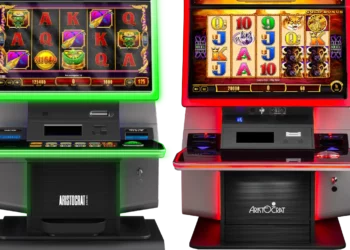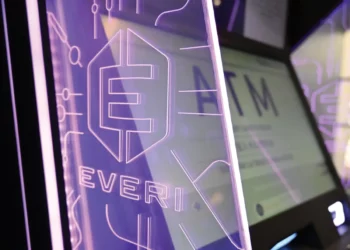The big international slot manufacturers are gradually getting more Asia-focused with their game development. Macau-based Laxino Technology always was, and now they’re busy creating mobile versions of their successful online slot and table games, and taking their game development further with the consumer insights gleaned from living and breathing Macau, interacting with big players and tapping into their extensive online data base
The current buzzword among international slot machine manufacturers targeting Asian markets is “localization.” This is in part an acknowledgement that until recently as a group they had not always done enough to create products specifically designed for the region’s players. That, however, is understandable considering the big slot suppliers’ sales in Asia outside of Australia are still a tiny fraction of total worldwide sales.
Macau had 16,585 electronic gaming machines at the end of last year, year, giving it a comfortable lead among Asia’s legal gaming jurisdictions. Still, that puts all of Macau’s installed EGM capacity below the 10% annual replacement rate on Australia’s 197,892 machines. The US had 849,859.
So for slot makers, Asia is a long-term investment but a fairly safe one given casino expansion across the continent and the insatiable demand from mainland Chinese players.
For the most part, “localization,” as far as Asian gaming is concerned, means catering to Chinese preferences. Macau was designed with Chinese players in mind. So was Malaysia’s venerable Casino de Genting (which by law is off limits to Muslims, effectively barring the country’s ethnic Malay majority), as well as the casinos at Singapore’s sprawling integrated resorts. Asia’s other emerging casino destinations are also banking on Chinese to drive their businesses, from the mid-level-VIP-targeted NagaWorld in Phnom Pehn to the swanky new Solaire in Manila Bay.
Slots only started taking hold in Macau from 2003, and as the players mature, their preferences are evolving rapidly. They are also forming strong brand loyalties to the companies who were quickest to adapt and create Chinese-themed games. The major slot manufacturers now regularly fly their developers into Macau to familiarize them with the market and how it’s changing. They also have set up design studios and development centers in Australia, India, China and elsewhere.
Developing in Macau
Macau-based IT solutions company Laxino Technology Ltd was founded by Lam Iao in 2008, born of his desire to create opportunities for aspiring local IT professionals in his hometown.
The fast-growing company now has 80 employees and is involved in a wide range of IT services, but given its roots in the world’s most dynamic gaming market, it started out with very much a gaming focus, providing a full range of support and services to both online and land-based gaming operators. The company also has an active gamedevelopment division, which has released several online slot titles, as well as Internet versions of popular casino and peer-to-peer card games.
Laxino has already reconfigured three of its popular online slot games—Three Brothers, The Legend of Feng Shen and Paramount—for mobile platforms, and plans to release a few more over the course of the year. The company will then also devote its resources to releasing its online table games on mobile platforms.
The rationale for developing mobile apps, and particularly casino games, is obvious. Mobile broadband subscriptions in Asia and abroad are exploding, and by letting gamblers place bets during downtime anywhere they are, rather than tethering them to desktops, online gaming operators are likely to derive considerable incremental revenue. Providing free-to-play apps of popular slot games also appears to serve a substantial marketing and promotion function.
“We’re currently working on the play-for- fun version of Paramount,” says Terry Lee, the company’s product manager for mobile slot games. “One of our clients wants to put out a free promotional game for the iTunes store. So we’re doing Paramount for iOS [Apple’s mobile operating system]. We already released it on Android, so we need to do some modification for iOS.”
“All Laxino’s software is developed in-house in Macau, in line with Lam’s goal that when people think about IT in Macau, he wants them to think of Laxino,” stresses Mr Lee.
Technical support is also carried out from Macau, adds Martin Tam, the company’s product manager for mobile table games. “We have a 24/7 help desk, and the app support team monitors the network traffic in order to provide a stable environment for their players. We monitor traffic 24/7. If sometimes traffic drops we immediately find out what’s the problem. If traffic drops, there could be some network problems in certain areas. You need to react really fast to switch the line to another area.”
Mr Tam has also worked on developing math models for games at Laxino since the company started, and in this endeavor he is helped greatly by having access to the rich, real-time customer data bases of the online operators they work with. “So we can analyze the math and try different things. A lot of data analysis is available to us in developing games.”
With employers around Macau bemoaning the difficulty of finding and retaining quality staff in the city, especially when deep-pocketed casinos can swoop in with higher-paying offers for valuable IT staff, Laxino appears to have done a good job in holding on to its talent. “Which is why we also focus on the work environment, job satisfaction, having a family feel. You can’t compete on the basis of salary alone with the casinos,” adds Mr Lee.

Providing free-to-play apps of popular slot games serves a substantial marketing and promotion function



































